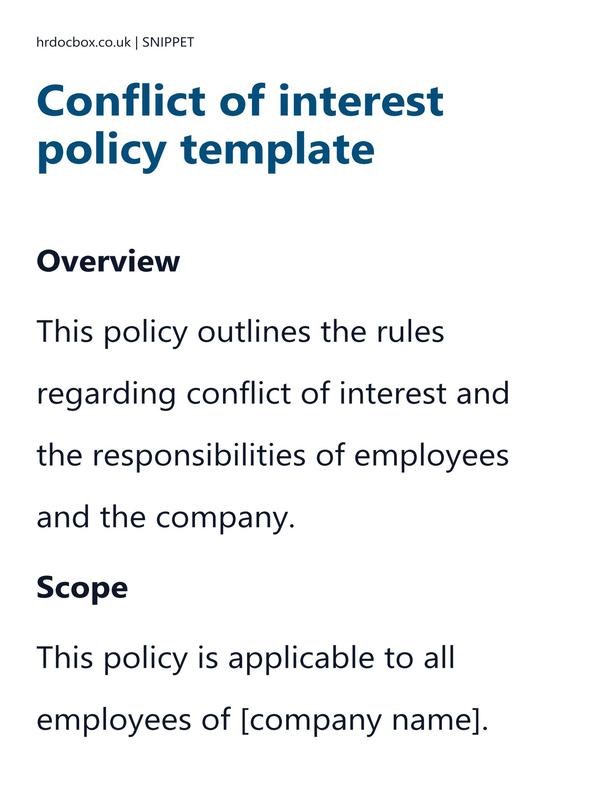Conflict of interest policy template


Use this model conflict of interest policy to outline the rules regarding conflict of interest and the responsibilities of employees and the company in resolving any such discrepancies.
- Includes Conflict of interest policy template, plus 12 months’ access with all updates provided free of charge and notified to you.
- UK-specific accuracy.
- 292 words over 2 pages.
- Last updated 07/03/2023.
- Format: Word / plain text / email.
- Delivery: Instant download after purchase (no physical item).
- Access: Download link shown here after checkout.
- This Conflict of interest policy template will SAVE you up to 1 hour drafting & research. Save cost. Reduce risk.
Conflict of interest policy
1 Overview
1.1 This policy outlines the rules regarding conflict of interest and the responsibilities of employees and the company.
2 Scope
2.1 This policy is applicable to all employees of [company name].
3 General principles
3.1 The relationship of the company with its employees should be based on mutual trust. As the company is committed to preserve the interests of people under its employment, it expects them to act only towards its own fundamental interests.
Conflict of interest may occur whenever an employee's interest in a particular subject may lead them to actions, activities or
This is a 30% preview of the Conflict of interest policy template. For instant full access, purchase this item or a parent bundle.
Conflict of interest policy template purpose
A conflict of interest policy is a set of guidelines and procedures that an organisation establishes to ensure that its employees, officers, directors, and other stakeholders act in the best interests of the organisation and avoid any conflicts between their personal interests and those of the organisation.
The policy outlines the types of conflicts of interest that may arise, such as financial interests, family relationships, or other personal connections, and provides specific steps for employees to disclose any potential conflicts of interest. It may also include guidelines for addressing conflicts of interest, such as recusal from decision-making or seeking independent advice.
The purpose of a conflict of interest policy is to promote transparency, integrity, and accountability in organisational decision-making and to protect the organisation's reputation and financial well-being. By having a clear policy in place, organisations can prevent or mitigate the negative effects of conflicts of interest on their operations and relationships with stakeholders.
Practical application of a Conflict of interest policy template
- Issue the Conflict of interest policy template during onboarding / after changes / planned refresher.
- Send it to appropriate internal recipients such as employees, workers, contractors etc. and request confirmation that is has been read and understood.
Frequently Asked Questions about a Conflict of interest policy template
Frequently Asked Questions about a Conflict of interest policy template
-
Can I use the Conflict of interest policy template in my small business?
Yes. The Conflict of interest policy template is designed to be flexible and suitable for organisations of all sizes, including small businesses and charities. It follows UK employment law best practice, so even if you don't have an in-house HR team, you can confidently apply it.
-
Is the Conflict of interest policy template compliant with 2026 UK employment law?
Absolutely. Like the Conflict of interest policy template, all of our templates are drafted with the latest ACAS guidance and UK employment legislation in mind. We review and update them regularly, so you can be confident they remain compliant.
-
Can I customise the Conflict of interest policy template for my organisation?
Yes, we highlight the areas of the Conflict of interest policy template that you need to update with your own details, and where you need to make decisions to suit your situation. This saves you time and ensures that you meet best practice.
-
Do I get instant access to the Conflict of interest policy template?
Yes. Once purchased, you'll be able to download the Conflict of interest policy template instantly. Templates are provided in editable Word or Excel format so you can customise them easily, and in PDF format for easy sharing.
-
What if I need more help, not just a Conflict of interest policy template?
If you're looking for broader support, we also offer toolkits and library bundles that include the Conflict of interest policy template, along with other HR templates and policies for fully managing your situation. These may be more cost-effective if you need deeper advice.
-
Why should I use this Conflict of interest policy template, and not AI to generate it?
The risk of using a free AI-generated template 'without review' includes your legal exposure, missing context, and no awareness of the wider process, whereas purchasing the Conflict of interest policy template from us mitigates that risk.
